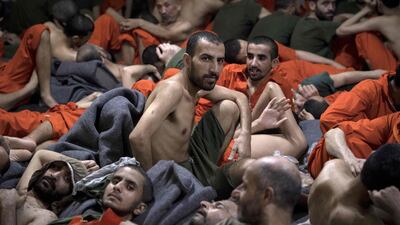Syria's Kurdish forces said they expected revenge attacks by ISIS following the US announcement on Sunday that the jihadist organisation's leader Abu Bakr Al Baghdadi had been killed.
"Sleeper cells will seek revenge for Baghdadi's death," Mazloum Abdi, the top commander of the Syrian Democratic Forces — the de facto army of the Kurdish administration that holds thousands of IS fighters in custody — said.
"This is why anything is possible, including attacks on prisons," he said.
The SDF, who were the US-led coalition's main partner on the ground in Syria during years of operations against ISIS, hold an estimated 12,000 ISIS suspects in a number of different facilities in north-eastern Syria.
An SDF-led operation eliminated the last scrap of ISIS's self-proclaimed "caliphate" — which once covered vast territory in Syria and Iraq — in March.
The territorial defeat of the jihadist group did not however mean the death of the organisation or of its ideology.
Small units of fighters have since gone underground and continued to carry out guerrilla-style attacks in the region.
US President Donald Trump, who announced Al Baghdadi's death in a solemn address from the White House Sunday, had said last year that he intended to pull his troops from Syria.
US forces have indeed withdrawn from some areas in northern Syria, although they are remaining in regions of eastern Syria that include oil wells.
The vacuum created by the US redeployment and a subsequent operation launched by Turkey and its proxies against Kurdish forces has heightened fears of mass ISIS prison breaks.
Attacking prisons to free large numbers of senior operatives has been a signature tactic in resurgence drives by ISIS's earlier iterations.
Mr Trump thanked the Syrian Kurds "for certain support they were able to give us" in the operation against Al Baghdadi.
Mr Mazloum had said in an earlier post on social media that the operation against the ISIS leader had resulted from joint intelligence work.
The SDF also said on Sunday it had agreed to withdraw more than 30 kilometres from the Turkish border following a deal between them, Turkey and Russia. The Syrian government welcomed the move, saying it "removes the main pretext for flagrant Turkish aggression on (Syrian) territory".
It said the government would help citizens reintegrate, "which paves the way for everyone for a return to Syrian national unity, in land and in people".

